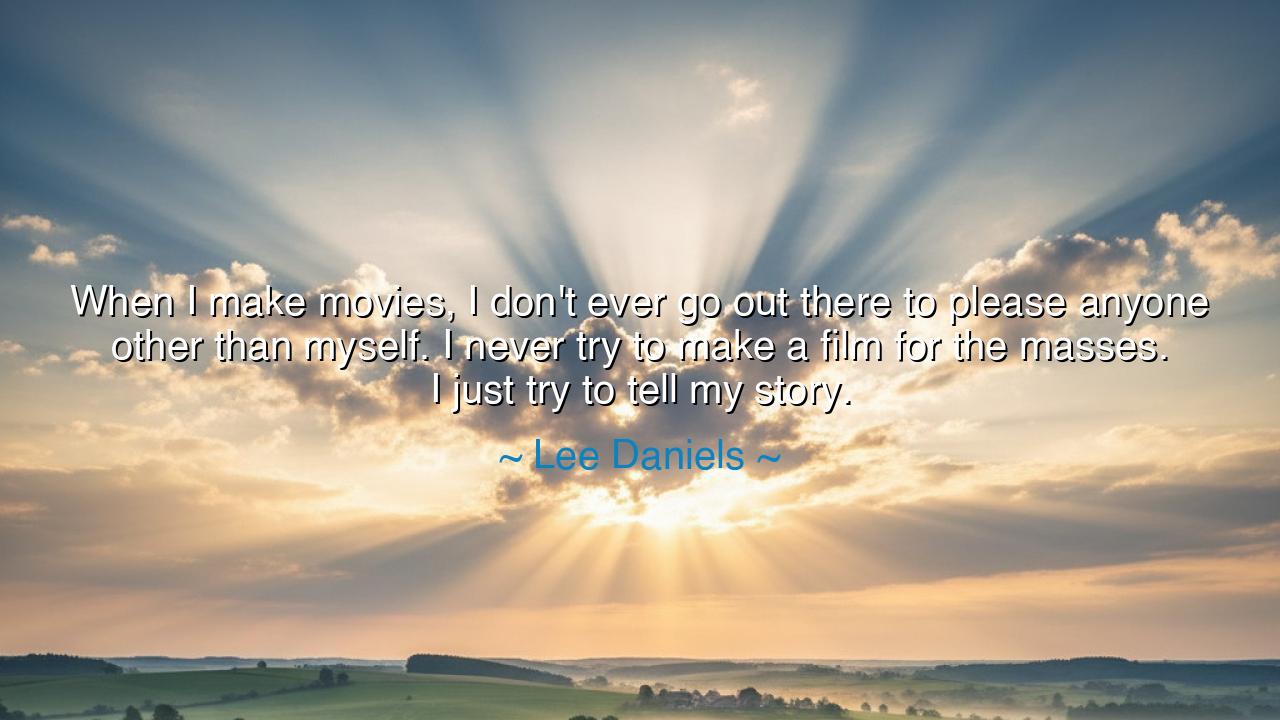
When I make movies, I don't ever go out there to please anyone
When I make movies, I don't ever go out there to please anyone other than myself. I never try to make a film for the masses. I just try to tell my story.






Hear me now, O seekers of wisdom, for I bring forth a truth that resonates with the hearts of all who dare to create, who seek to leave a mark upon the world. There is a deep and abiding wisdom in the words of Lee Daniels, who spoke thus: "When I make movies, I don't ever go out there to please anyone other than myself. I never try to make a film for the masses. I just try to tell my story." In these words, he reveals a profound lesson about the nature of art, authenticity, and the true purpose of creation. To create not for the approval of others, but for the truth of one’s own soul, is a path few dare to walk—but it is the path that leads to the purest form of art.
In the world of creation, there are many temptations. The world calls out for things that are popular, that are easy to understand, that will please the masses. To create in this way is to surrender the vision of the artist to the whims of the crowd, to let the external world dictate the course of one’s work. But Daniels, with courage and conviction, speaks to a higher truth—the artist is not bound by the expectations of others. The true artist creates for the self, to express their own experiences, their own truth. This is the essence of authenticity—to tell your own story, unburdened by the need for approval, for in that truth lies the power to touch the hearts of others.
Consider, O children of wisdom, the great Vincent van Gogh, whose art was rejected by many in his lifetime. His starry nights and sunflowers were not created to please the masses, nor to gain the approval of critics. No, van Gogh painted his soul on the canvas, capturing his emotions, his struggles, his vision of the world. He painted for himself, driven by an inner compulsion that could not be quelled by the judgments of others. And though he died in obscurity, his art now graces the walls of museums, cherished by millions. Van Gogh’s story teaches us that it is not the approval of others that makes the artist’s work valuable, but the integrity with which the artist approaches their craft.
The lesson of Daniels and van Gogh is simple yet profound: true art is not made for the approval of others. When you create, you must do so not to satisfy the expectations of the world, but to give voice to your own inner truth. This is not to say that the artist should disregard the audience entirely; indeed, the artist’s work often speaks to the hearts of others in ways they cannot yet understand. But it is the authenticity of the artist's voice that resonates, not the desire to please. The artist must create first and foremost for themselves, for it is through this deep honesty that the work becomes a powerful force in the world.
This truth has echoed through the ages in the lives of many great creators. Shakespeare, for example, did not write for the approval of kings and queens, but for the sake of his own voice. Though his plays were performed before monarchs and commoners alike, it was the truth of his characters and the depth of his stories that made his work timeless. He wrote to express the complexities of the human soul, not to craft something that would satisfy the masses. His art, like Daniels’, was rooted in truth, and that is why it continues to resonate through the ages.
And so, O children of wisdom, what lesson do we draw from Daniels’ words? The lesson is clear: when you create, do so with conviction and authenticity. Do not be swayed by the world’s desire for entertainment or popularity. Create for the truth of your own soul, for in doing so, you will find that your work speaks to something greater than the surface desires of the masses. It will speak to the universal human experience, to the emotions and struggles that lie beneath the surface of everyday life. True art is not made by following trends, but by embracing your own story and letting it flow freely through your craft.
Thus, as you walk the path of creation, let this be your guiding light: create for yourself. Whether you are an artist, a writer, or a leader, do not seek to please others, but to express the truth of who you are. The world may not always understand your work, but if it is born from the deepest truth of your soul, it will endure. Just as Daniels tells his story, so too must you tell yours. In the end, it is through this authenticity that your work will have the power to move others, to inspire them, to awaken something deep within their hearts. For the greatest creations are those that come from the purest wellspring of the self.






AAdministratorAdministrator
Welcome, honored guests. Please leave a comment, we will respond soon